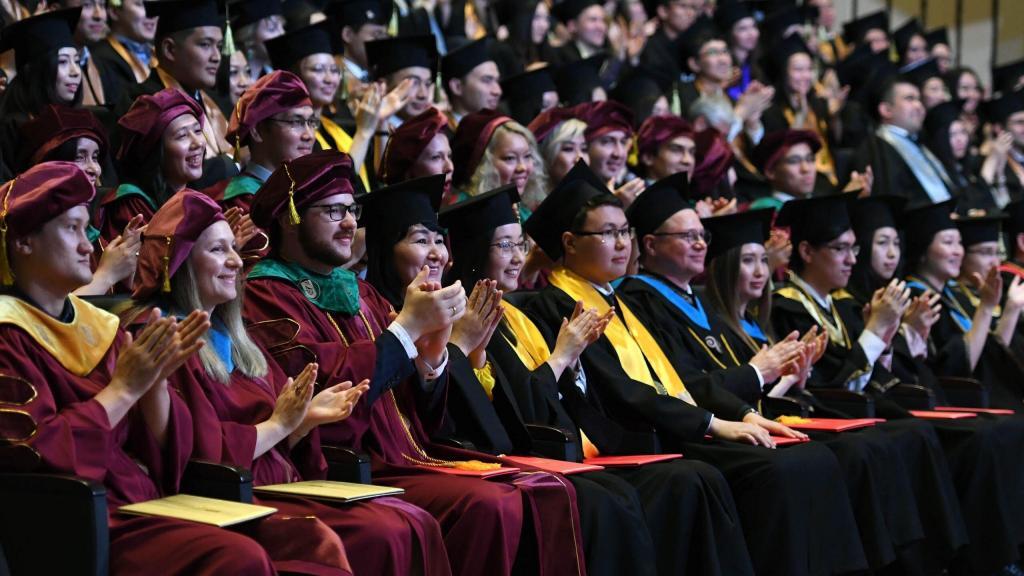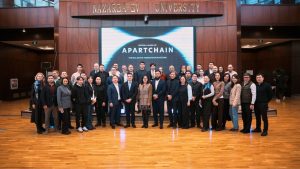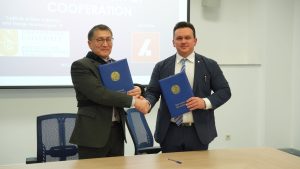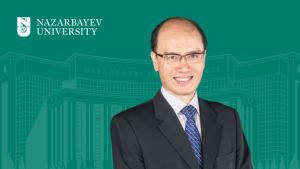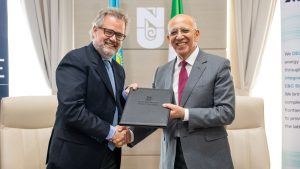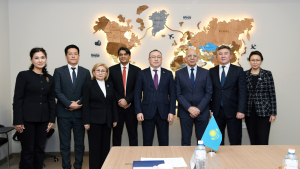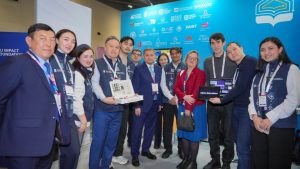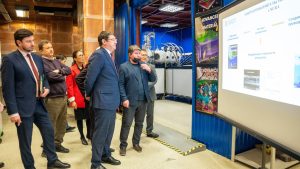This year NU is celebrating its first major anniversary: 10-year jubilee!
It’s a great opportunity to look back on the goals achieved, missions completed, explore new possibilities and plan future steps to take. What are the main outcomes after these 10 years? – questions many people pose right now.
First of all, an enabling legal framework in 2011 conferred academic freedom and institutional autonomy to a university. In addition to the legal framework, NU leadership has from Day One been hardnosed about two principles: students enter NU on merit only – no other considerations apply; and a strong commitment to academic integrity and excellence has served as a cornerstone for the creation of a research-oriented university. These are our hallmarks.
NU facts and figures
Our research performance is one key measure of our success. NU research is taking off, with citation impact (a commonly applied yardstick measuring how frequent NU research publications are cited by fellow scientists and authors) over the last five years already at 25 % above the global average, almost a third of the research is published in the top 10 international peer-reviewed journals. Starting from 2011 NU has published 3,789 research papers. Thomson Reuters recognized NU as the most cited research institution in Kazakhstan in 2016. Using these research metrics, NU is already comfortably ensconced in the top 10 CIS universities and the top 20 of Central and Eastern European universities. For instance, NU is ahead of Lomonosov Moscow State University and close to the Seoul National University and the University of Tokyo. This indicator is 20 – 30% of the assessment weight of the world ranking criteria.
[siteorigin_widget class=”SiteOrigin_Widget_Image_Widget”]”,”after_widget”:””,”before_title”:””,”after_title”:””,”widget_id”:”widget-0-0-1″}}” />[/siteorigin_widget]
Source: Scopus database via SciVal as of 13/11/2019
NU graduates today
Over these 10 years, 6 cohorts of students have graduated from Nazarbayev University, the last Class of 2020 has received its diplomas two weeks ago. In total, over 4600 people have become university graduates over the years. About 94% of them work in Kazakhstan and contribute significantly to the development of national science and economy.
NU Innovation is breaking new ground both by commercializing the work of our scientists and by facilitating and promoting technology-oriented start-up enterprises powered by our own students and graduates as well as by a diverse group of tenants at NU’s Technopark. Annually, NU runs an ABC QuickStart program for accelerating innovative projects the goal of which is developing an innovative environment by increasing the number of high-tech projects for venture companies, corporations, government, and the general community. Over the last four years, five acceleration programs and four incubation programs provided the platform for more than 85 startup teams and for more than 1,500 NU students to compete. In total, 140 startup projects have successfully completed business acceleration and business incubation programs. Financial and administrative support to research projects is also supported by the team of NU Commercialization Office with 74 national and international patents (63 national patents, 5 – Eurasian, 3 – US patents, 3 -Europatents), and with 7 licensing agreements concluded.
The work of our students has earned the place among the top recognized companies in Silicon Valley, IT giants like Facebook, Google, and Apple. NU alumni also develop the Kazakhstani economy, healthcare, the public sector and education, work in the National Bank of the Republic of Kazakhstan, BI group, ERG, medical and scientific centers.
Currently, there are almost 1000 of our graduates aspire to continue their studies for Masters and PhD degrees in Kazakhstan and abroad. The acquired knowledge and research skills allowed almost 500 of them to receive fully-funded grants at world-renowned universities as the University of Oxford, MIT, Harvard University, National University of Singapore, Stanford, Columbia, and many others. The key to successful admission was their excellent academic progress and research papers published in the top research journals during their studies at NU.
NU graduates are our major ambassadors all over the world who develop the brand of the university. Today they thank their Alma Mater and congratulate it on its first significant jubilee:
Aigerim Abdiorazova, Master of Public Health graduate of 2018 is the Head of Department at the National Research Cardiac Surgery Center: “The knowledge and skillsets obtained during my studies have benefitted my personal development, and are helping me so much in my career. I can truly feel that I have been contributing to the development of health services in the country”.
Tamirlan Seidakhmetov, Chemical Engineering graduate of 2015 was admitted to a full scholarship to Stanford. Now he is a Data Scientist at Apple Inc.: “NU taught me to think outside of the box, overcome challenges, achieve big goals and provided tremendous networking opportunities!”
Nazerke Kalidolda, Computer Science graduate of 2018 is a Software Engineer at Google: “NU was a unique and definitely unforgettable experience filled with travels. I would always be grateful to my alma mater for so many opportunities given and the lessons taught in its walls. Thank you and happy 10th birthday!”
World ranking
According to the National Committee on Statistics, there are about 130 universities in Kazakhstan, yet the number of national HEI’s in the world rankings remains very limited. A reasonable question can be asked: why is it that NU, as a leader of national higher education, is not ranked among other international HEIs?
As outlined in the Strategy of NU for 2018-2030, the university does not plan to participate in the global university rankings until 2030. NU has deliberately postponed its participation “to avoid the ranking system typecasting it before it is fully developed and internationally competitive at the highest levels”. NU has set itself the goal of being present in a highly respectable bracket within the global rankings of top universities in the next few years.
The university, however, consistently participates in processes of institutional assessment, the preliminary results of which are published on the NU website. This includes the recent institutional evaluation by the European University Association. To date, several NU Schools are also working on international accreditation; in September 2019 the European Association for Public Administration Accreditation (EAPAA) accredited the Graduate School of Public Policy’s (GSPP) two Master’s programs. The British accreditation agency BALEAP accredited the program “English for Academic Purposes” of the NU Center for Preparatory Studies for prospective undergraduate students in 2020. Currently, the NU Graduate School of Business (NUGSB) is working on the second stage of accreditation by the Association to Advance Collegiate Schools of Business (AACSB), where only 5 percent of the business schools in the world succeed in gaining recognition.
There are many analytical agencies worldwide that offer their own assessment of the quality of educational institutions. Three of the leading agencies, generally accepted and recognized by the academic community, are the Times Higher Education (THE), Quacquarelli Symonds (QS) and Academic Ranking of World Universities (ARWU).
The co-founder of QS, Matt Symonds, spoke about the main criteria for entering the above-mentioned rankings. According to Matt, each of the compilers evaluates higher educational institutions (HEI) based on a number of criteria. For ARWU, for example, prestige and historical reputation are important, including the number of Fields and Nobel Prize winners among students and researchers. THE focuses on academic research and teaching and learning. For QS the key factors include the opinion of employers and the results of a global survey of the academic community, which is based on the response of reputable scientists, faculty and university leaders around the globe.
The assessment of HEI’s by recognized ranking agencies helps to place these institutions on the global map. Whether the rankings truly reflect the quality of the institution remains a question. NU plans to evolve at a natural and sustainable pace and enter the world rankings at a competitive level in line with its strategic intent.
Social responsibility
Since its establishment, NU has been committed to share its experience with higher education institutions with the aim to reform the higher education system in the country. The sharing experience process is a systemic conceptual process that covers all aspects of the university’s activities – academic, research, innovation, and administrative. Professional development programs, webinars, conferences, workshops, job shadowing, site visits developed and organized by NU since 2011 has been engaging thousands of representatives of Kazakhstani higher education institutions and resulted in the establishment of professional associations, development of new academic programs, joint research projects and publications, implementation of NU’s values and principles, and positive changes to the Law on Education expanding academic freedom and institutional autonomy. NU faculty, researchers, and staff share their experience and provide an expert evaluation in program design and evaluation, academic quality enhancement, institutional research, student affairs, career advising, human resources management, economic planning, psychological counseling, library, and many other areas. NU’s governance model served as an example for other HEIs and resulted in the introduction of corporate and shared governance principles in the majority of national and state universities (through the establishment of Supervisory Boards), the appointment of rectors of state universities through open competition; and reorganization of national and state universities to non-commercial joint-stock companies.
Even in these difficult times, NU supports the country in the fight against coronavirus by launching the NU Community Solidarity Initiative on COVID-19 in April of this year. This Initiative is a project created and supported by NU faculty and staff who were eager to help, either financially or through other means, in order to express solidarity with the host country to contribute to the fight against the spread of the pandemic. Mindful of these current challenges, students and graduates also do not stand aside, despite the associated risks, acknowledging the hard work of the medical staff, they have started raising funds and delivering free lunch boxes to the hospitals’ medical workers, who are currently the frontline fighters against COVID-19.
While studying at NU, students demonstrate an increasing appreciation of the opportunity granted to them to study at NU; they are willing to pay back society by venturing into start-ups and thus creating new jobs and opportunities for others. Many have chosen to become social entrepreneurs not only to benefit themselves but improve the lives of Kazakhstan’s citizens! The projects focus on medical and social needs. For example, ReLive exoskeleton helps stroke patients in faster rehabilitation by mentally managing the artificial limbs through a special helmet. Our alumni Galym Beitimbetov and Daniyar Batyrov provide Almaty citizens with free drinking water systems on the streets. The research projects and startups of Some NU students and researchers devote their efforts to eco fuel and energy, saving energy and heating consumption. NU alumna Aizhan Alzhanova has launched an important social project “Mama Pro” – the Support Fund for socially vulnerable women who find themselves in difficult situations.
To sum up, today we can confidently say that over the past 10 years, NU has contributed to the development of a new generation of young and talented people who think critically and are not afraid to challenge themselves, take risks, and create something significant.
By its next anniversary, the university plans to officially enter the top university rankings. We will continue our resilient work and remain to be a place that attracts the best and most progressive generation of students and researchers who will provide value to its nation and innovate to make the entire world hear and talk about them.
